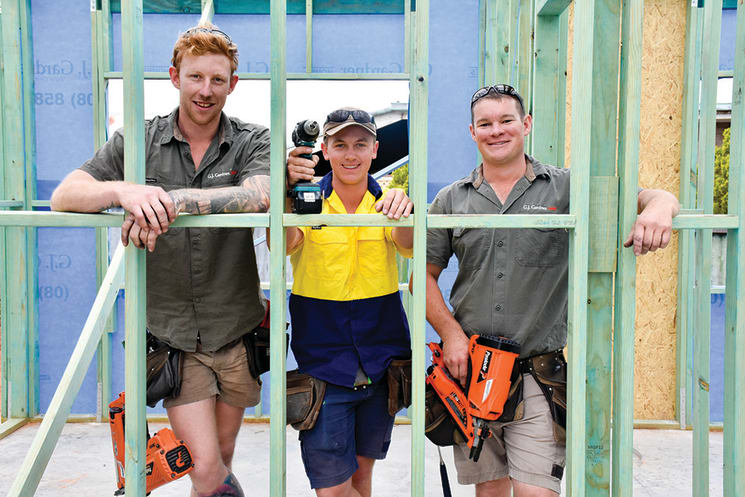
G.J. Gardner Riverland carpenters Zac Frahn, Will Holmes and Jordan Owen have been working hard to meet extra construction demand across the region prompted by the HomeBuilder incentive program. PHOTO: Peta-Marie Philippou
INCENTIVE funding programs have seen first-time home builders snap up land across the Riverland and a local building company reverse the economic impacts of COVID-19 on its business.
Funding coming from the Federal Government’s HomeBuilder Grant is currently allowing owner-occupiers to apply for $25,000 grants to “build a new home, substantially renovate an existing home or buy an off-the-plan home”, if construction begins within three months of a contract being signed between June 4 and December 31, 2020.
G.J. Gardner Riverland operator Sam Pearce said the scheme reversed what was anticipated to be a downturn in construction projects throughout the region.
“Like a lot of others, when the COVID outbreak started in March and April for us here, a lot of contracts were put on hold,” Mr Pearce said.
“Then basically when they announced the grant, most of those jobs that were put on hold got called back into action.
“It’s certainly gotten a lot of people moving that we had been talking with for a year or so, but it’s also brought some new clients out as well.
“We probably tend to do a higher percentage in Renmark, but there’s a good spread among the other towns as well and even into the Mallee.”
Mr Pearce said added demand for builders – generated by the grant programs – had allowed G.J. Gardner to provide more employment opportunities to local apprentices.
“Anything that provides jobs eventually helps population growth,” he said.
“Now us and plenty of others are actively seeking more people to employ, and we’ve certainly taken on a couple of extra apprentices in the last couple of months to gear up for this period.
“It’s creating jobs and that’s what it’s designed to do.
“We can see the benefits when before we were concerned we would need to put people off, but it’s gone the other way and we’re putting people on.”
Elders Riverland real estate sales manager Dave Kanizay said an increase in subdivision and land development opportunities would also encourage new residents to the region.
“(Sales consultant) Kym Radloff from Renmark said that four allotments which he has listed are now sold (and) all had multiple offers, so they had to go to the highest and best offer,” Mr Kanizay said.
“One of the allotments that sold had not had any interest in the 12 months prior the grant.
“We have also had an increase in interest from landowners looking at options to subdivide and sell their land as a development opportunity which is interesting.
“What we need is to attract developers to ensure these land divisions go ahead and the Riverland continues to grow.”
Mr Kanizay said local stimulus prompted by the programs would also be crucial to smaller Riverland contractors recovering from COVID-19 impacts.
“The grants have certainly encouraged first home buyers and new home builders to build during a time where they may have otherwise decided to hang back and wait,” he said.
“This has been great for our local economy and in particular it’s kept the building industry moving and tradies in jobs.
“Prior to COVID-19 the local property market was as strong as it ever has been and after a short slump in sales… we are now seeing the property market back to about 90 per cent of where it was pre COVID-19.”
Member for Barker Tony Pasin said the grant programs had received an “overwhelming” response in the Riverland.
“The Master Builders Association has described HomeBuilder as having delivered the most effective stimulus in decades,” Mr Pasin said.
“HomeBuilder is designed to generate construction activity by giving confidence to those who may have pulled back from undertaking a new build or substantial rebuild in March when the pandemic hit.
“There is no doubt that it’s unquestionably achieving this objective (and) this is a fantastic outcome for our local building, design and construction industry and real estate sector.”
However, Mr Pearce said obstacles posed by bank processing of grant applications, or time taken to receive council approval, could see some projects fail to begin within the stipulated three-month timeframe to receive funding.
“You’ve got to organise soil tests, engineering and then obviously get council approval. As long as it’s a fully compliant application there’s not too much of an issue, but not all of them are,” he said.
“Getting the finance approval has certainly been a hold-up on some jobs. We’ve had one or two already that have been very close to the cut-off point.
“On our end they’ve had council approval and we’ve had our stuff in line, it’s purely waiting on the finance approval.
“In a lot of cases it’s gone through quite quickly and we’ve done it in half that time, but in some of the more complicated cases there’s extenuating circumstances.
Mr Pearce said Revenue SA assesors – who would be responsible for any potential extensions to the three-month timeframe – would “look favourably” upon applications which had been affected by delays.
“We spoke with Revenue SA in reasonable depth and got more clarity on it,” he said.
“They do say that under certain circumstances they could have extensions to that three months.
“Extensions should be granted, but they aren’t guaranteed to be granted.
“For all builders I think there’s going to be quite a bit of pressure to watch those timeframes and watch those dates, because you’re playing with a lot of money for the client.”





